|
|
|
Sort Order |
|
|
|
Items / Page
|
|
|
|
|
|
|
| Srl | Item |
| 1 |
ID:
172647
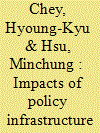

|
|
|
|
|
| Summary/Abstract |
Despite burgeoning research on the internationalization of the Chinese renminbi, there has been surprisingly little systematic analysis of how the renminbi is actually used in foreign markets. This study provides a cross-country analysis of renminbi use in offshore foreign exchange markets, with special attention to the effects of the cooperative policy measures adopted by China and foreign states to promote the renminbi’s international use. We find that a country’s participation in the Renminbi Qualified Foreign Institutional Investor scheme (which expands its renminbi investment opportunities) and its establishment of an offshore renminbi clearing bank (which provides better renminbi payment services), but not its entry into a renminbi–local currency swap agreement, facilitate use of the renminbi in its foreign exchange markets. States have played a significant role in the rise of the renminbi as a newly internationalizing currency.
|
|
|
|
|
|
|
|
|
|
|
|
|
|
|
|
| 2 |
ID:
172652


|
|
|
|
|
| Summary/Abstract |
Representation is always a dynamic relation, a tatonnement, in which the represented adjust their preferences on the basis of beliefs induced by the representatives. All rulers—those selected in clean elections, those who hold such ceremonies without putting their power at stake, and those who do not even bother to hold them—claim to have reasons to be followed, and people are willing to follow them if they believe these are good reasons. Thus, individual preferences, “wills,”are influenced by the relation of representation. The controversial issue is whether the relation of representation can be assessed when preferences are endogenous, in particular when people are not exposed to a plurality of reasons.
|
|
|
|
|
|
|
|
|
|
|
|
|
|
|
|
| 3 |
ID:
172651
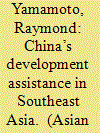

|
|
|
|
|
| Summary/Abstract |
China’s growing development assistance has become commonly perceived as a threat to the autonomy and development of Southeast Asian countries that had promoted by Japan in the past. This paper challenges that understanding by comparing China’s development assistance with Japan’s engagement in the region. The comparison supports an alternative perspective, which sees Chinese development assistance as favorable for Japan’s interests.
|
|
|
|
|
|
|
|
|
|
|
|
|
|
|
|
| 4 |
ID:
172650
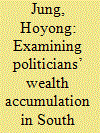

|
|
|
|
|
| Summary/Abstract |
One of the public’s popular beliefs about politics is that politicians engage in rent-seeking behaviors, such as accumulating property, using their political power. By applying a regression discontinuity design, this study examines whether members of the National Assembly of South Korea gained assets during three elective terms (2004–2008, 2008–2012, and 2012–2016). The results contradict the public’s claim. In general, there is minimal evidence that election winners accumulate more assets than runners-up. And observing the winners’ premium for newly elected politicians in the 2012–2016 term, I find that it is related to a political support fund, which is a legitimate channel for politicians’ funding. The results suggest that an information disclosure policy can play a pivotal role in restricting politicians’ rent-seeking behaviors.
|
|
|
|
|
|
|
|
|
|
|
|
|
|
|
|
| 5 |
ID:
172654


|
|
|
|
|
| Summary/Abstract |
In this article, we join an ongoing debate among Western scholars on political representation and argue that political representation is undergoing a transformation stimulated by the rapid proliferation of the new information and communication technologies. We propose that in China, the new social media have stimulated a shift from representation by official organizations to bottom-up self-representation, and from mandate political representation to embodiment. To grasp this change, we select private entrepreneurs as our focus of study and propose the concept of “connective representation.” Drawing on fieldwork in China from 2015 through 2019 and on analysis of online materials, we demonstrate how private entrepreneurs in China form and advance their collective interests through online connectivity. The concept of connective representation adds to the conventional perspectives on political representation, particularly in the authoritarian setting.
|
|
|
|
|
|
|
|
|
|
|
|
|
|
|
|
| 6 |
ID:
172648


|
|
|
|
|
| Summary/Abstract |
It is widely believed that Pakistan’s newly demonstrated nuclear weapons capability emboldened that country to launch what became the Kargil conflict of 1999 and correspondingly restrained India in responding to the attack. This article argues, however, that decision-making on both sides was driven by non-nuclear factors.
|
|
|
|
|
|
|
|
|
|
|
|
|
|
|
|
| 7 |
ID:
172653
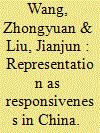

|
|
|
|
|
| Summary/Abstract |
Studies of political representation have focused on responsiveness driven by electoral mechanisms in liberal-democratic regimes. In a single-party system like China’s, how does the government respond to citizens’ service requests? Whose and what interests are being represented in governmental responsiveness, and to what extent? This article explores these questions through the lens of “representation as responsiveness” by analyzing an exclusive data set from the city public service hotline in Shanghai. Data analyses show that Chinese municipalities have good responsiveness to citizens’ practical concerns, and the quality of responsive representation has been improving in recent years. However, some groups of residents tend to be underserved for multiple reasons. This article argues that a responsive model of authoritarian representation will become a significant source of resilience for the party regime.
|
|
|
|
|
|
|
|
|
|
|
|
|
|
|
|
| 8 |
ID:
172649
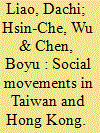

|
|
|
|
|
| Summary/Abstract |
We propose the logic of communitive action to analyze digitally networked social movements. Through an examination of Taiwan’s Sunflower Movement and Hong Kong’s Umbrella Movement, we offer an explanatory framework of community consciousness that elucidates a new type of leadership, and discuss crowdsourcing as a supplement to the theory of social movements in the digital age.
|
|
|
|
|
|
|
|
|
|
|
|
|
|
|
|
|
|
|
|
|